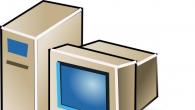Optimizing Windows XP is a whole range of activities that need to be periodically carried out on a computer so that it always works smartly and without interruptions. Conditionally, the optimization of Windows can be divided into several stages:
- Cleaning up the system disk.
- Defragment your hard drive and registry.
- Cleaning the cache.
- Cleaning the Temp folder.
- Installing and working with utilities for optimizing Windows.
How to speed up Windows XP with built-in Disk Cleanup
First of all, let's turn to the built-in Windows tools, for this Windows XP has its own capabilities, such as disk cleaning and cleaning system files.
- We open " Mya computer"And on the local disk we perform a right click with the mouse, in the context menu we need a section -" Properties».

- In the window that opens, there is a button " Cleaningdisk", Click on it, the system will analyze the garbage files in the system, after which you can delete the found files.

Below there is a graph where it is proposed to compress this disk forsavingsplaces, it is not recommended to mark this item. This can negatively affect the performance of the system as a whole, and will save no more than 100 megabytes of space. We remove the mark from this point and perform cleaning.

- If you switch to the tab “ Additionally", Then you can find a few more partitions for cleaning system files, files for recovery, temporary Windows components. Here you can also uninstall unnecessary programs on your computer.

Defragment your hard drive and registry
In the local disk properties window, in the “ Service”, We can check the disk for errors and fix them if any are found. The built-in utility is responsible for this function. CHKDSK.
Here we can defragment the hard drive. Usually, when we are actively working at the computer, we download something, delete something, and so on over and over again. The hard drive itself consists of many mirrored drives, which are divided into sectors. Each sector is the minimum addressable unit of information storage, into which we write something, and then we delete something from it. Initially, on the new system, all information is recorded in order, but after deleting some previously recorded files, disk space is freed up and new files are written to this place. If the sector is small for recording a file as a whole, then this file is divided into parts and written in different parts of the disk. 
This is fragmentation, when one file is divided into many parts and scattered all over the disk. Defragmentation gathers all fragmented files together and arranges them in order on disk. The process is quite lengthy, in some cases may take several hours. The same applies to defragmenting the registry, but it is best done using third-party utilities, which we will discuss later.
Clearing the cache
In this case, we are talking about clearing the browser cache. This can be done manually, directly in the browser itself, simply by deleting the history (the order of clearing the cache and clearing the browsing history is different in each browser). Here in the image is a short list of hotkeys for invoking the specific browser settings menu and the path to clear the browser history. 
Cleaning the Temp folder
There is such an interesting Temp folder on the computer, it is located on the system drive in the Windows folder. And it serves as a temporary storage of files intended for updating, restoring the system. This folder contains temporary files for installing programs, drivers and utilities. Some programs delete temporary files after installing themselves, but most do not. And over time, the size of this folder grows to an incredible size of tens of gigabytes. Naturally, noticeably reducing the speed of the computer, when the free disk space tends to zero, and it is not clear what exactly takes up so much space. Advice, look into this folder and delete everything that is there from there. The folder itself cannot be touched, but its contents can be safely deleted.
 Installing and working with utilities for optimizing Windows
Installing and working with utilities for optimizing Windows
The easiest way for a novice user is, of course, to optimize the system using third-party software. There are a lot of utilities that help optimize Windows on the Internet, both good and not so - both paid and free. Which program to choose for solving the optimization problem is, of course, only for the user to decide. But there is a wonderful program among them that should be on the computer of every user - this is CCleaner. As part of the Free version, it copes with the bulk of the user's system problems perfectly. For example, clearing the cache of all browsers at the same time, fixing registry errors, defragmenting the disk and registry, working with scheduled tasks, and much more. 
Installing CCleaner, like any other program, is very simple, just a few clicks. Has a clear Russian-language interface. The program is free and easy to use. Even an inexperienced user can handle it. 
How to speed up the work of Windows XP - for these purposes, you can also pay attention to another program, of the so-called cleaners, a very good utility is AVG TuneUp - it is, of course, paid, but has a trial period when you can test it before buying. 
In terms of its properties and capabilities, it is difficult, probably, to find a better one. It's easier to say what this program does not know how to list all its capabilities.
Hello dear guests and readers of the blog site. Today we will talk about how to increase computer performance... I think that many of you have already noticed that over time, your computer starts to work worse and worse.
So, the operating system crashes, gives errors, and this is despite the fact that the computer may be equipped with a fairly powerful processor and RAM. Some applications refuse to launch at all, and so on.
Naturally, the user wants to speed up your computer? Therefore, today we will look at ways to speed up a computer running the Windows XP operating system. Although, some of the tips are relevant to users of other operating systems.
There are different ways to speed up computer robots:
1. You can dig deeper into the BIOS settings, but it is dangerous and beyond the reach of a novice PC user.
2. Also, you can apply physical methods and significantly speed up your computer. I mean replacing its components with more modern models. But this method requires an investment of money, and why change if the problem of most modern computers is not in the hardware.
Any computer, even a powerful one, will work slowly due to the heavy load on the system. Let's just optimize your Windows Xp operating system to speed up your computer.
How to speed up your computer in the simplest steps?
For Windows to work successfully, your hard drive must be as free as possible, and also partitioned into local partitions. So that you can allocate a separate local section for the operating system, and a second local section for your other files that are stored on the hard disk.

If, however, this disk is full, you need to free the local disk (C) from all unnecessary.
![]()
To do this: Move all unnecessary files from the desktop to the local drive "D", leave only shortcuts. You can create a shortcut to any folder or file by right-clicking on it and choosing "Create shortcut" from the drop-down menu.
Free the folder "My Documents", "Shared Documents", "My Music", "My Pictures".
This can be done by going to "Control Panel"? "Installation and removal of programms", but it is more correct to do it as described.
But I want to warn you that you need to delete only those applications that you know. Since uninstalling the wrong program, you can cause unstable computer operation. If, you are not sure which applications can be removed , better don't touch anything and skip this step by going to the next way to speed up your computer.

You need to watch out for autoloading, since when Windows starts, programs that you do not use are often automatically launched, and they devour RAM. Accordingly, they cause a decrease in computer performance.
Such programs are usually found in the startup section, you can open it by going to the menu. But, we will use a more reliable way, go to the "Start" menu, go to "Run" (You can use the key combination Win + R) and enter the command "msconfig":


This is one of those simple and effective ways to speed up your computer. . I recommend defragmenting your hard drive at least once a month. This will help the system search and find the files you need faster.
In order to enable defragmentation, you need to right-click on the hard disk partition. In the drop-down menu, select "Properties", then go to the "Service" tab and just below select "Disk Defragmenter"... Read more about defragmenting your hard drive.

When working on a computer, we perform many different actions: install, create, install, move, delete, and so on. However, Windows does not do all these actions until the end, there are remnants of these files and actions in the system. Which, for example, allow you to restore this file after deletion. If there is a lot of this garbage, accordingly it becomes the cause of unstable computer operation. In order to clean the system of this junk, it is enough to use one of the many system cleaning utilities, such as Ccleaner,.

To be honest, many novice users do not even know about the need to clean their computer. This is also due to the fact that Microsoft did not include the system cleaning function in any version of Windows.
Another way to speed up your computer is to use the Windows tweak program. For Windows XP, it's best to use XP Tweaker, which is free. You can learn more about it by visiting the official website of the program:.
Tweakers should be used with caution, because these programs can significantly change the way Windows works.
Turning off visual effects can significantly speed up system performance. To do this go to " Control Panel"? "System" ? "Additional"? "Performance" ?"Options and select"? "Provide the best performance".

Well, so that everything is not so dull on the computer. After turning off the visual effects, can you change the Windows theme, go to the Control Panel? Screen? Design and change it.
This optimization method is more complex, but with the right approach, you can significantly speed up the system. For more information on how to disable unnecessary Windows services, read.
I would be grateful if you supplement me in the comments, or give your opinion on speeding up the operating system.
What affects the performance of Windows XP
Many have noticed such a paradox - on two computers with similar hardware characteristics, the download and operation speeds of the same version of Windows XP differ significantly. It would seem that this should not be - since the hardware and operating systems are the same, then the performance of these two PCs should be equal. However, practice shows that this is not nonsense, but quite an ordinary phenomenon, because many factors affect the operation of Windows, and all of them affect its performance.
What determines the performance of Windows XP? In order to more accurately highlight a number of important points, we discard the influence of the hardware component and focus on the system itself and its content.
So, the following leads to a decrease in the performance of Windows.
- Active use - installing and uninstalling applications, creating and deleting files, etc., etc. After you uninstall programs, trash usually remains in Windows directories and registry - data that is no longer used or needed. Often this garbage is at startup, and the system at startup is forced to look for files on the hard disk that are not there. The more debris has accumulated, the more the decrease in performance will be felt.
- Inappropriate allocation of hard disk space. It is not uncommon to see attempts to save disk space by shrinking the system partition. Do not forget that since the installation of Windows XP, the size of the system catalogs increases several times. It's all to blame, so to speak, - installing programs and system updates, filling temporary folders, creating restore points, user files in the Downloads directories, My Documents, Desktop, etc.
- Excessive system decorations and various visual effects in the design of the user environment: animation on the desktop, complex screensavers, styles that imitate three-dimensionality, shadows, transparency, and so on.
- Adware and viruses. Everyone knows that malware can negatively affect the performance of a computer, but in addition to them, applications for displaying ads (adware), often disguised as various useful things, such as toolbars, widgets on the desktop, etc., create a lot of problems. They not only interfere with their presence, but also actively use PC resources in the background - they collect information, transmit data to the network, download and play advertisements. This greatly slows down the system's response to your actions.
- Insufficient size and incorrect location of the paging file, especially with low memory capacity.
- Fragmentation of data - parts of one file, scattered throughout the hard disk, the computer takes much longer than if the entire file was in one place.
- Refusal to install updates for Windows XP. Releases of new versions of applications, especially gaming, multimedia and specialized ones - demanding on resources, are designed to work with updated system components, which with each new version improve the interaction of Windows and programs. And, accordingly, they give an increase in performance.
- Intensive background activity of the system, for example, maintaining the history of opening documents, writing to event logs, indexing files for faster searches. If the computer is not the fastest, it noticeably affects the speed of its work.
- Background activity of programs, especially downloading or distributing torrents.
We deal with the reasons for the decrease in system performance
How do you determine what is causing the problem in your case? What will help speed up Windows XP? We will find out based on a specific situation.
Windows XP computer boots slowly
Possible reasons
- A large number of automatically launched programs.
- Accumulation of garbage at startup.
- Viral infection.
- "Heavy" design theme.
Solution
- Disable autorun of unnecessary and even more absent programs using the system setup utility. To do this, press the key combination "Windows" and "R", in the "Open" line of the "Run" program, enter the command Msconfig and click OK. Open the "Startup" tab and uncheck the applications that you want to disable automatic start. Be careful, you do not need to disable something that you do not know the purpose of.
- Next, open the "Services" tab. Check “Do not display Microsoft services”. Only application services and Windows components will remain in the list, the disabling of which is not particularly important for the operation of the system. Uncheck the boxes next to the services of programs you do not need. Be careful, disabling antivirus, Plug and Play (Microsoft) and what you don't know is not recommended.
- You can also use the following method to determine which of the programs and services affects the download speed the most: completely disable the autostart of applications and services (except for Microsoft) and restart the computer. If the system starts faster after that, enable the disabled part and reboot again. In this way, you can easily find the culprit.
- If the described methods did not find the source of the problem, or if there are files or services unknown to you in the startup list, perform a full anti-virus scan.
- If your computer is not the most productive, you can speed up its work by refusing to use non-standard themes. To improve the performance of Windows, disable additional "decorators" that do not have any benefit other than aesthetic. Right-click on the “My Computer” shortcut and select “Properties”. Open the "Advanced" tab. Click the Options button in the Performance section of the window. To turn off all visual effects, click “Provide Best Performance”. You can turn off only some of the parameters by unchecking the checkboxes in the "Special Effects" list.
Reduced overall system performance, Windows XP computer is running slowly
Possible reasons
- "Garbage" of the system with the remnants of not completely deleted programs.
- A large amount of unnecessary startup.
- File fragmentation.
- An overly full system partition.
- Waste virtual memory (paging file).
- Viral infection.
- Excessive background activity of the system and programs.
- Switching the IDE controller of the hard disk on which the system is installed to PIO mode.
Speed up your system by cleaning up debris and disabling unused features
- Remove unnecessary from startup using the method described above.
- Clean the disk using standard Windows XP tools: open the “My Computer” folder, right-click on the C drive and select “Properties”. On the General tab, click Disk Cleanup. From the list provided, select the files to delete (from the recycle bin, temporary folders, old system restore files, logs, index directories, etc.). You can mark "Compress old files" - this will slightly increase the space on the system partition.
- Going to the Advanced tab, disable unused Windows components, uninstall unnecessary programs, and delete old system restore points.
- To clean the registry from unnecessary entries, use third-party applications such as Ccleaner, Auslogics Registry Cleaner, JetClean, Registry Optimizer and analogues. Using the same programs, you can clean up temporary folders, search for and delete duplicate files, manage startup and otherwise optimize the system. It is only important to understand that using such tools without proper experience and knowledge can lead to the crash of Windows, and do not forget to create restore checkpoints before starting them.
- To reduce the load on PC resources and thereby cause some acceleration of the system, do not forget to close programs that you are not currently using and disable background services that affect performance. Such as event log, volume shadow copy, and so on, which are listed, for example,. Also in the properties of local drives (opened through the context menu of each drive in the "My Computer" folder) on the "General" tab, uncheck "Allow disk indexing for quick searches" - this option, in addition to accelerating data search, reduces the overall performance of Windows XP.

Streamlining disk space allocation
- Defragment files on your hard drive. From the "Start" - "All Programs" - "Accessories" - "System Tools" select "Disk Defragmenter". First, click the "Analyze" button, and if the system informs you about the need to defragment the volume, click on the "Defragment" button.
- If your problem is caused by a lack of free space on the partition where the system is installed, move some of the user data to other locations so that at least a third of the space on the system partition remains empty.
Optimizing memory usage
- For rational use of memory, configure the paging file (pagefile.sys) - a special place on the hard disk where the system transfers part of the data from RAM to temporary storage. This is especially true if your computer is equipped with only one or two gigabytes of "RAM". To configure the swap file, right-click on the "My Computer" shortcut and open the "Advanced" tab. Click the Options button in the Performance section. Here also open the Advanced tab and click Change under Virtual Memory. Set pagefile.sys to 1.5 - 2 times the amount of RAM you have. Larger increase or complete disabling of the paging file is unlikely to speed up your computer.
- If your hard drive has more than one logical partition, it is advisable to move the paging file from drive C to a location where Windows is not installed. To do this, on the same tab, select a non-system partition from the list of disks (in our example, drive F), specify the size of the paging file and click “Set”. Windows XP performance should improve.

The mode in which the hard disk controller operates (applies only to IDE disks) also has a strong impact on the performance of the computer. Normally, it operates in direct memory access (DMA) mode, bypassing the central processor - this provides high performance. In cases of various problems, the controller can automatically switch disks to PIO mode (in simple terms, this is memory access using a processor), which works several times slower. Although the problem is not directly related to Windows XP (it is usually a hardware problem), in some cases, you can deal with it using system settings.
- Launch the device manager through the properties of “My Computer”, the “Hardware” tab.
- In the list “IDE ATA / ATAPI controllers” find the primary IDE channel.
- Through the context menu, open its properties and go to the “Additional parameters” tab - the “Device 0” section (this is your system disk).
- If the “Transfer Mode” line reads “PIO Only”, switch it to “DMA, if available”. This action can speed up the PC performance several times.
Over time, the performance of any operating system decreases, even if it is fully functional. This process can be compared with the natural aging of the body, in which “slags” - biological waste - accumulate in cells during their life. The same applies to Windows XP: despite periodic cleaning, after one or two years its performance is already noticeably reduced. This is due to the fact that standard cleaning methods using the system tools are not effective enough - even after the correct uninstallation of programs, some of the garbage remains, gradually reducing performance. The computer, accordingly, loses its former agility, and the user cannot understand why this is happening.
Of course, you can reinstall the system from scratch every year or buy new hardware for your computer, but we still think that it is not very rational to increase performance by such methods.
To speed up your PC and slow down the process of "slagging" the system, at least once every 2 - 3 months, do the following:
- full anti-virus scanning of all hard drives and removable media, in addition, you can use tools to combat Trojans and adware, such as Ad-Adware, Malwarebytes' Anti-Malware, etc.
- periodic cleaning of temporary folders - you can use the standard Windows function "Disk Cleanup";
- checking the file system for errors with the function of fixing using the Windows utility chkdsk.
And for a better uninstallation of programs, use third-party applications such as Revo Uninstaller, Uninstall Tool and analogues. Then the acceleration of the system will occur naturally and your computer will maintain good performance for a long time.
Your attention in the article will be presented really useful tips that will help you increase and speed up your personal computer Windows xp, if you are tired of its constant slowdown. And the main thing is to carry out preventive work on your computer more often.
Why PC slows down
There may be one reason here, or there may be several. It needs to be tested, tuned and optimized. Here are the most common reasons your computer can slow down:
- Temperature... Often users are not interested in their processor at all, and this is in vain. You can check it by putting your hand on the radiator, but you can get burned or let the current pass through yourself. I do not advise. The most reliable way is to download a special program, for example Everest... Run it, select "computer", then "sensor". If the processor temperature is above 50 degrees, then you should think about it. Check the operation of the fans, blow out the heatsink, or even better, remove the heatsink and apply thermal paste to the processor, which has most likely dried out over the years.
- Registry... It's not good when you install and uninstall a lot of programs. Unfortunately, the removal of the program does not mean that it has been completely removed from the computer. Amazing right? And this is an extra load on the processor when performing various tasks. Use a free program CCleaner and try to clean up this garbage. It is not difficult to work with this program. Run it, select the "registry" tab, mark all the checkboxes, below click the "search for problems" button. The program will find a bunch of unnecessary invalid extensions in the registry and errors. Click the "fix" button and the program will do its job, removing the unnecessary and fixing what is possible.
- Paging file... If you have little RAM and a small paging file, then demanding games will slow down. Right-click on the icon "my computer", then "properties" - "advanced" - "performance" - "parameters" - "advanced" - "virtual memory" - "change" - "special size", set approximately 1500 - 2000 , after which several times "OK" and you're done.
- Autostart. Too many running programs are eating up your memory. When installing any programs, very often they are added to startup - these are programs such as ICQ, uTorrent and many others. Go to "start" - "run", write msconfig, in the window that appears, select the "startup" tab. We remove all the checkmarks from unnecessary programs here, be sure to leave "ctfmon" and of course your "antivirus". Click then "apply", then "ok" and "reboot". After the computer restarts, check the box so that you are not reminded of the changes you made.
- System hard drive overloaded... Local disk "WITH", is systemic and most often it is only about 20 - 30 gigabytes in size, and some people keep huge folders with music and movies on their desktop, and what lies on the desktop takes up space on the C drive. Store a lot on other drives!
- Viruses. Viruses such as "Salita" slow down the work of programs. Make sure your
An old Windows XP computer can work fine if you follow a few tips and optimize your software. How to make Windows XP run and boot faster? After these simple procedures described below, you will notice a real difference in the download speed and computer performance.
In this article, we will talk about really weak PCs, and we will provide simple settings for increasing. So let's get down to speeding up Windows XP boot and run:
Tidying up the desktop
Some of the precious RAM is taken away by the desktop wallpaper and screen saver. To speed up and work Windows XP, it is better to remove the wallpaper: "Desktop" - "Right mouse button" - "Properties" - "Desktop" - "Wallpaper" - "(no)".
On the right, you can select a desktop fill color, which does not affect performance in any way. We also disable the screensaver: "Desktop" - "Right mouse button" - "Properties" - "Screensaver" - "Select a screensaver from the list" - "(no)".
Slightly reduce the quality of color rendering
It is done like this: "Desktop" - "Right mouse button" - "Properties" - "Options" - "Color quality". In the settings, select "Average" (as a rule, it does not exceed 16 bits). The load on the video card will be significantly reduced, and your eyes will not even notice the changes.

Change the style and turn off visual effects
If you want Windows XP to boot and run as fast as possible, you'll have to sacrifice beauty in favor of an outdated, classic style. "Desktop" - "Right mouse button" - "Properties" - "Appearance" - "Windows and buttons" - "Classic style".

You can also significantly improve the performance of Windows XP by turning off all visual effects. It is done through "My Computer" - "Right Mouse Button" - "Properties" - "Advanced" - "Performance" - "Options" - "Visual Effects" - "Provide the best performance".

cleanup startup
To speed up the startup of Windows XP, you need to remove unnecessary programs from startup. During installation, many programs are added to startup (Skype, ICQ, etc.), that is, they are launched when the computer is turned on. The more programs there are at startup, the slower the computer boots. Therefore, programs that you do not need immediately after booting up your computer should be disabled. They can always be started later.
Autoloading is configured through the msconfig utility. "Start" - "Run" - "msconfig" - "Enter". The "System Settings" window will open, select "Startup". Now we remove the check marks from those applications whose autorun you do not need.

If you have a lot of programs in startup, then Windows XP will load much faster, and the amount of free RAM will increase, which will have a positive effect on the speed of work.
We clean the system disk in time
Keep an eye on the system drive (most often drive C), for normal system operation, at least 300 MB is required.
These simple steps can dramatically improve the speed at which Windows XP boots and runs, making your computer experience much more enjoyable.






